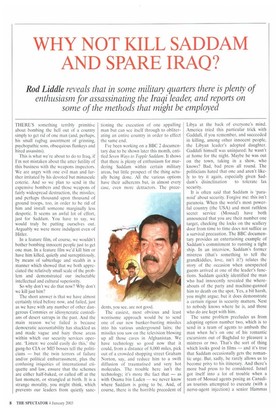WHY NOT KILL SADDAM AND SPARE IRAQ?
Rod Liddle reveals that in some militaly quarters there is plenty of
enthusiasm for assassinating the Iraqi leader, and reports on some of the methods that might be employed
THERE'S something terribly primitive about bombing the hell out of a country simply to get rid of one man (and, perhaps, his small ragbag assortment of grinning, psychopathic sons, obsequious flunkeys and hired assassins).
This is what we're about to do to Iraq, if I'm not mistaken about the utter futility of this business with the weapons inspectors. We are angry with one evil man and further irritated by his devoted but minuscule coterie. And so we plan to send in the expensive bombers and those weapons of fairly widespread destruction, the missiles; and perhaps thousand upon thousand of ground troops, too, in order to be rid of him and install someone marginally less despotic. It seems an awful lot of effort, just for Saddam. You have to say, we would truly be putting ourselves out. Arguably we were more indulgent even of Hitler.
In a feature film, of course, we wouldn't bother bombing innocent people just to get one man. In a feature film we'd kill him or have him killed, quietly and surreptitiously, by means of subterfuge and stealth in a manner which showed that we both appreciated the relatively small scale of the problem and demonstrated our ineluctable intellectual and cultural superiority.
So why don't we do that now? Why don't we kill just him?
The short answer is that we have almost certainly tried before now, and failed, just as we have with any number of other dangerous Commies or idiosyncratic custodians of desert satraps in the past. And the main reason we've failed is because democratic accountability has shackled us and made vague and hazy those areas within which our security services operate, 'Listen: we could easily do this,' the gung-ho CIA or MI5 bosses tell the politicians — but the twin terrors of failure and/or political embarrassment, plus the confusing iniquities of international etiquette and law, ensure that the schemes are either half-baked, or called off at the last moment, or strangled at birth. It is a strange morality, you might think, which prevents our leaders from quietly sane tioning the execution of one appalling man but can see itself through to obliterating an entire country in order to effect the same end.
I've been working on a BBC 2 documentary due to be shown later this month, entitled Seven Ways to Topple Saddam. It shows that there is plenty of enthusiasm for murdering Saddam within certain military areas, but little prospect of the thing actually being done. All the various options have their adherents but, in almost every case, even more detractors. The prece dents, you see, are not good.
The easiest, most obvious and least worrisome approach would be to send one of our new bunker-busting missiles into his various underground lairs: the missiles you saw on the television blowing up all those caves in Afghanistan. We have technology so good now that it could, from a distance of 8,000 miles, pick out of a crowded shopping street Graham Norton, say, and reduce him to a swift diffusion of traumatised and very hot molecules. The trouble here isn't the technology; it's more the fact that — as with Osama bin Laden — we never know where Saddam is going to be. And, of course, there is the horrible precedent of Libya at the back of everyone's mind. America tried this particular trick with Gaddafi, if you remember, and succeeded in killing, among other innocent people, the Libyan leader's adopted daughter. Gaddafi himself was uninjured: he wasn't at home for the night. Maybe he was out on the town, taking in a show, who knows? Bad, bad press all round. The politicians hated that one and aren't likely to try it again, especially given Saddam's disinclination to tolerate lax security.
It is often said that Saddam is 'paranoid' about security. Forgive me: this isn't paranoia. When the world's most powerful country (the USA) and most ruthless secret service (Mossad) have both announced that you are their number one target, checking the locks on the scullery door from time to time does not suffice as a survival precaution. The BBC documentary provides an entertaining example of Saddam's commitment to running a tight ship. In an interview, Saddam's former mistress (that's something to tell the grandkiddies, love, isn't it?) relates the story of the occasion when unexpected guests arrived at one of the leader's functions. Saddam quickly identified the man who had innocently revealed the whereabouts of the party and machine-gunned him to death on the spot. Yes, a bit harsh, you might argue; but it does demonstrate a certain rigour in security matters. Next to nobody knows where he is, and those who do are kept with him.
The same problem precludes us from adopting option number two, which is to send in a team of agents to ambush the man when he's on one of his romantic excursions out of Baghdad to pleasure a mistress or two. That's the sort of thing which looks good in films — and it's true that Saddam occasionally gets the romantic urge. But, sadly, he rarely allows us to become privy to his itinerary. And there's more bad press to be considered. Israel got itself into a lot of trouble when a team of Mossad agents posing as Canadian tourists attempted to execute (with a nerve-agent injection) a senior Harnmas leader in the Jordanian capital, Amman. They were arrested having merely grazed their target's cheek. The Hammas man survived.
On another occasion, allegedly, a Mossad team rehearsed a trial assassination of a Saddam lookalike. It was not a success: people were killed. In fact, the only one to survive was, of course, the Saddam manqué. The plan was not given the go-ahead.
Infiltrating Saddam's inner sanctum has also been tried by the West. The trouble on this occasion was that the infiltrators rather hit it off with Saddam's senior security men, to the point that they parted the best of friends. They probably still send each other Christmas cards, I suppose this is a rather touching little story. It was, however, no use in getting rid of Saddam.
The best approach, you might think, would be to persuade one of Iraq's beleaguered and unhappy generals to stage a military coup, with a bit of Western assistance. But the last CIA operative who got involved in that found himself arrested upon his return to the USA. The charge? Attempting to overthrow the legitimate head of a foreign government. The agent was a bit miffed at this. A disgruntled Iraqi general had been primed and was ready to do the deed; the agent, therefore, thought he'd done a pretty good job. Instead of receiving a hero's welcome, he was arrested. Later the charges were dropped and he was duly honoured with lots of nice ribbons, but this failure of political will, or conflict and confusion over our aims — often at the last moment — has dogged almost every attempt to liquidate or remove Saddam by covert means.
And again, you might expect that it would do so when you examine the precedents. For at least 15 years the US have attempted to kill or overthrow Fidel Castro. Here are a few of my favourite alleged (they don't admit to most of them) CIA escapades: • Staging the Second Coming of Christ off the coast of Havana in the hope that the fervently Roman Catholic population of Cuba would rise up as one and kick out the no-good atheistic Commie dictator.
• Putting stuff in his beard to make it fall out, thus robbing him of his strength and charisma.
'Trying to put dynamite in his cigars.
• Placing an exploding conch in Fidel's favourite diving spot.
And then, of course, there was the Bay of Pigs.
Forty years later Fidel is still bearded, still diving, still in charge, still boring the hell out of everybody with five-hour speeches to the UN, while America seethes on the sidelines. Nothing worked. Nothing came remotely close to working. The stuff with the beard and the conch and Jesus Christ were too madcap to work; other attempts foundered because of political vacillation in Washington.
And so, the military boffins are our last hope of direct action against Saddam. They are hard at work, these strange people, devising tiny drones — clever, unmanned, robot planes — which could be released upon Baghdad like a swarm of killer bees, trained to hunt for Saddam. This, you might think, is more like it. Send in the killer bees. These devices have such names as 'Dragon's Eye', which probably tell us more about the literary tastes of their progenitors than the effectiveness of the robots. And, er, they're not quite ready yet. They're nearly ready, say the boffins. Just give us a bit more time, they mutter, as Dragon's Eye or Gandalf's Sword or whatever suddenly shows very real human frailties by coming to an abrupt and final halt on a demonstration run.
Which leaves us with our last option — the Iraqi people. Let us assume for a moment that the 100 per cent pro-Saddam vote in the recent referendum was the result of a flawed electoral process, and that your average Iraqi has actually had more than enough of Saddam Hussein. Some experts look to the downfall of Nicolae Ceausescu — another somewhat solipsistic, omnipotent dictator — as a blueprint for what might happen in Iraq. Eventually, the economic conditions will get so bad that the scales will fall from the eyes of the people and they will overthrow Saddam Hussein. Don't bet on it. The collapse of the Ceausescu regime was effected by the Romanian people only after the dissolution of the entire Eastern bloc — and even then with some difficulty.
In fact, politicians looking for parallels might turn their eyes a few hundred miles north-west instead. Slobodan Milosevic was indeed ousted by his own people and handed over for trial, but only after the West had bombed his country flat, killing many of those aforementioned unlucky innocent people in the process. War, our politicians will be thinking; the tried and tested solution. Legal, clean and effective. So, come on: send in the bombers.
Seven Ways to Topple Saddam will be shown on BBC 2 at 9 p.m. on 26 January.



















































 Previous page
Previous page